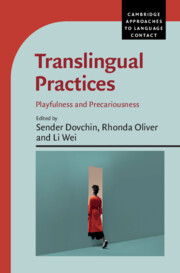
-
Select format
-
- Publisher:
- Cambridge University Press
- Publication date:
- May 2024
- May 2024
- ISBN:
- 9781009072779
- 9781316513514
- Dimensions:
- (229 x 152 mm)
- Weight & Pages:
- 0.53kg, 272 Pages
- Dimensions:
- Weight & Pages:
You may already have access via personal or institutional login
Book description
Bringing together work from a team of international scholars, this groundbreaking book explores how language users employ translingualism playfully, while, at the same time, negotiating precarious situations, such as the breaking of social norms and subverting sociolinguistic boundaries. It includes a range of ethnographic studies from around the globe, to provide us with insights into the everyday lives of language users and learners and their lived experiences, and how these interact in translingual practices. A number of mixed methodological frameworks are included to study language users' behaviours, experiences and actions, cover the complexity of language evolutionary processes, and ultimately show that precarity is as fundamental to translingualism as playfulness. It points to a future research direction in which research should be pragmatically applied into real pedagogical actions by revealing the sociolinguistic realities of translingual users, fundamentally addressing broader issues of racism, social injustice, language activism and other human rights issues.
Contents
Metrics
Altmetric attention score
Full text views
Full text views help Loading metrics...
Loading metrics...
* Views captured on Cambridge Core between #date#. This data will be updated every 24 hours.
Usage data cannot currently be displayed.
Accessibility standard: Unknown
Why this information is here
This section outlines the accessibility features of this content - including support for screen readers, full keyboard navigation and high-contrast display options. This may not be relevant for you.
Accessibility Information
Accessibility compliance for the PDF of this book is currently unknown and may be updated in the future.


